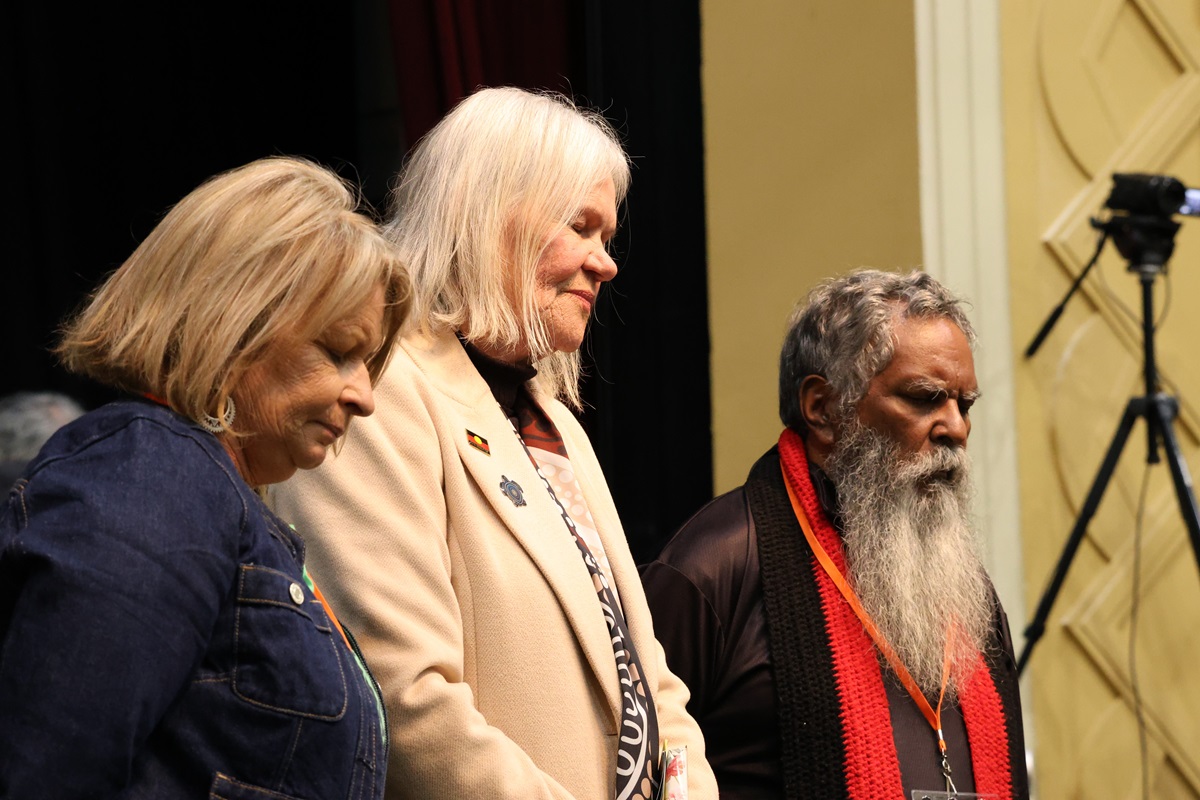
Moderator Rev Salesi Faupula and General Secretary Rev Dr Mark Lawrence during discussion today around the Faithful Futures Project.
Day three of Synod 2025 has ended, with past, and ongoing, injustices suffered by indigenous Victorians, and the Faithful Futures Project, dominating discussion today.
As members resolved today to take the first step towards exploring options for offering redress for historic injustices suffered by Victoria’s First Peoples, they were given a powerful reminder of why the issue is so important to indigenous Victorians.
First Peoples’ Assembly of Victoria’s Aunty Esme Bamblett told the meeting that a Treaty, to go before the Victorian Parliament soon, would help address past injustices suffered by First Peoples.
“Treaty should have happened 235 years ago when non-Aboriginal people came here, because this country was our country,” Aunty Esme said.
“Sovereignty has never been ceded, so Treaty is about giving back to us what should have happened a long time ago.
“As people belonging to God we should be looking for justice, and Treaty is about justice.
“Treaty is about our people, Aboriginal people, receiving that justice and that has never happened in this country.”
Click here to read a summary of Aunty Esme’s speech today.
Aunty Esme’s powerful words came shortly after members resolved to instruct the Synod Standing Committee to approve the terms of reference for the establishment of a working group to respond to recommendations contained in the Yoorrook Justice Commission’s recent Final Reports.
The Final Reports, ‘Yoorrook Transformations’ and ‘Yoorrook Truth be Told’, were tabled in State Parliament on July 1 and included two recommendations calling on Churches in Victoria to identify land that could be returned to the state’s First Peoples, and to share with them the proceeds from the sale of any land.
In seeking support from members, the proposal put forward by Rev David Fotheringham and Rev Jennie Gordon offered a rationale on why redress for past injustices was an appropriate step to take.
“None of us here today were part of the historical conquest of Victoria,” David and Jennie said in putting the proposal forward.
“However, the Synod has been a beneficiary of the colonial conquest of Victoria.
“Concerning the churches, the Yoorrook Justice Commission particularly focused its attention on land seized from Traditional Owners by colonial settlers which was then transferred to churches for little or no cost by the colonial authorities of the British Empire.
“The Synod has identified 127 properties currently held by the Church for which land was granted by the Crown in this manner, besides properties that had previously been sold.
“Approximately 10 per cent of Uniting Churches in Victoria have been built on land granted by the Crown.
“The Synod’s submission to the Yoorrook Justice Commission concluded with a statement that the Synod’s approach to reconciliation and redress revolves around a commitment to substantive justice being achieved through the lens of First Peoples’ self-determination, noting the Synod’s commitments to walking together as First and Second Peoples and to working cooperatively towards a more just future for First Peoples in the treaty process to come.”

Aunty Esme Bamblett with Leprena UAICC Tasmania’s Alison Overeem and UAICC Victoria’s Rev Will Pickett today.
Towards the end of tonight’s final session, consensus was finally reached on the proposal relating to the Faithful Futures Project, which had dominated proceedings since Synod 2025 began on Saturday.
The Faithful Futures Project will guide ministry and mission directions in Victoria and Tasmania for the next 10 to 15 years, and members today resolved to adopt the vision of ‘following Christ, walking together as First and Second Peoples, seeking community, compassion and justice for all creation’.
Members last night resolved to establish five goals as part of Faithful Futures, namely:
Coordinated Ministries: Coordinated ministry and mission in geographic areas such as Local Government Areas, renewing discipleship, and attentive to the life and needs of the local context, by 2030;
Respecting Country: Honouring the Church’s Covenant with the Uniting Aboriginal and Islander Christian Congress, all communities of faith will listen to and be able to tell about some of the histories of the Country on which they are located by the end of 2028; and be invited to develop local and appropriate ways to respond;
Intercultural Leadership: By 2028 to:
be providing appropriate intercultural leadership formation and equipping for all ministry agents and congregations; and
develop intercultural networks for worship, witness and service.
All-Age Growth: To have at least one all-age community of faith that is interactive, diverse, inclusive and transformative in 80% of Coordinated Ministries by 2030.
New Communities of Faith: establish at least five new Christian communities by 2030.
During today’s meeting, members also resolved to make a substantial change to the frequency of Synod meetings.
Members resolved that Synod meetings now be held every two years, rather than 18 months as had previously been the case.
However, Synod members may be recalled for an online or hybrid meeting in the second part of August-early September of the alternate year, if determined appropriate by the Synod meeting, Moderator or Synod Standing Committee.
Today’s decision means that Moderators will now serve in the role for four years, rather than three years as the case has been previously, commencing as of this current Synod meeting.


Comments are closed.